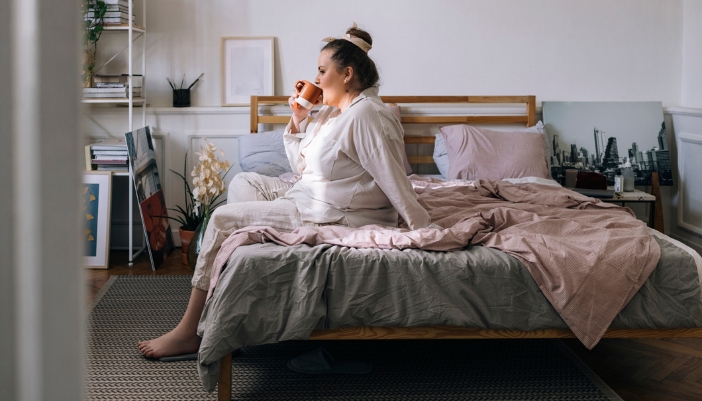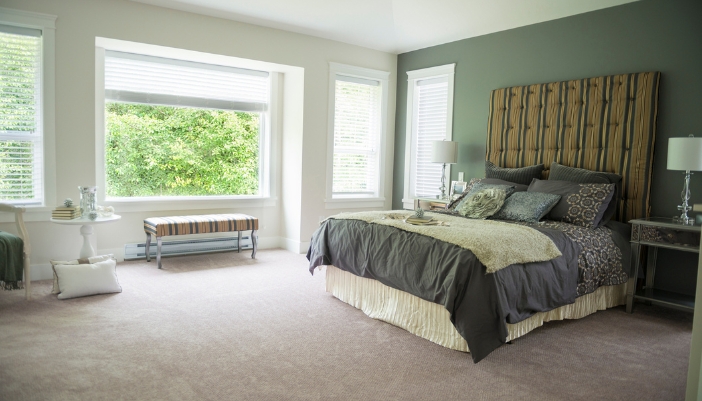Have you noticed how getting in and out of bed can sometimes be a struggle? Or maybe you find it hard to get comfortable at night? Surprisingly, the height of your bed could be the culprit!
Bed height isn't just about aesthetics — it can significantly impact your comfort and sleep quality. So, even though it might seem like a small detail, at Hudson Appliance, we know how much it can impact your sleep health; let's explore why the right bed height matters for your sleep!
Why Bed Height is Important for Your Sleep

When it comes to getting a good night's sleep, every detail matters, and bed height is no exception. The height of your bed can impact many sleep factors and the quality of your rest!
- Spinal Alignment: The right bed height helps maintain proper spinal alignment, reducing the risk of back and neck pain.
- Comfort and Restfulness: A bed at the correct height allows you to find a comfortable position more easily, leading to deeper, more restful sleep.
- Reduced Night-Time Disturbances: A bed that's easy to get in and out of can minimize disruptions if you need to get up during the night, ensuring a smoother, more continuous sleep cycle.
Ease of Climbing in and Out of Bed

Getting in and out of bed should be simple and effortless, right? But if you have a bed that's too tall or too low, getting into bed might be challenging — unless you account for these factors!
- Accessibility: Depending on stature or mobility issues, a bed that is too tall won’t be sufficient, while one that is too low might make it harder to access.
- Physical Strain: Constantly struggling to get in and out of bed can lead to aches and pains, particularly in the back, knees, and hips, so the right bed height can ease the pain. An optimal bed height can help maintain proper posture, reduce physical effort, and minimize the risk of developing or worsening pain in these areas.
- Considerations for Different Age Groups: Children, adults, and seniors all have different needs when it comes to bed height. For instance, a lower bed can be safer and more accessible for children to prevent falls, while seniors might need a higher bed to avoid excessive bending and ease their movements.
How Your Height Contributes to Bed Height

When it comes to bed height, you can't ignore one essential factor — your height!! The general rule of thumb is that the top of the mattress should be around knee level to make getting in and out of bed much more comfortable. But there are other factors to consider!
- For Shorter Individuals (Under 5'4"): Bed height should be between 16 to 20 inches from the floor to the top of the mattress.
- For Average Height Individuals (5'4" to 6'2"): Bed height should be around 20 to 24 inches for maximum comfort.
- For Taller Individuals (Over 6'2"): Bed height should be between 24 to 30 inches to reduce knee strain!
Pro Tip:
To find out if your bed is too high or too low, sit on the edge and see where your feet fall and the angle of your knees: if your feet don’t reach the floor, the bed is too tall; if your knees aren’t at a 90-degree angle, it’s too short!
Role of Bed Frames in Bed Height

Your bed frame is easy to overlook, but it plays a huge role in bed height and impacts how comfortable and accessible it is! Choosing the right frame can make all the difference for a good night's sleep, so you'll need to consider the differences.
- Standard Bed Frames: Including the mattress, these typically result in a total bed height of about 20 to 25 inches. and are versatile with various mattress thicknesses.
- Platform Beds: These create bed height that is 14 to 18 inches including the mattress, and provide a lower profile to your bed.
- Adjustable Beds: These can vary in height but generally have a total height of 20 to 30 inches (including the mattress!). They let you customize the height and position of your mattress, making them perfect if you have specific health needs or want flexibility.
- Bed Risers: Bed risers can add anywhere from 1 to 12 inches to your bed height, depending on the type and size of the risers you purchase. When combined with a mattress, the total bed height can range from 20 to 30 inches.
- Storage Beds: These often result in a total bed height of 18 to 24 inches, including the mattress, due to built-in drawers or compartments, but they might not be ideal for shorter individuals.
Pro Tip:
The typical mattress height ranges from 10 to 14 inches. When calculating your total bed height, ensure the combined height of your bed frame and mattress fits within the comfortable range of 24 to 30 inches for optimal comfort and accessibility.
Adjusting Bed Height to Suit Your Needs

Once you've chosen the right bed frame, you might find that you still need to adjust the height of your bed for optimal comfort and accessibility. But it doesn't mean you need a whole new bed!
- Mattress Toppers and Pads: Adding a mattress topper or pad can increase the height of your bed by 1 to 4 inches while also adding comfort.
- Box Springs: If your bed frame allows, add a box spring to significantly increase bed height. Box springs come in different heights, typically 5 to 9 inches (make sure to factor this in with your bed frame and mattress height!).
- Platform Inserts: Adding inserts or spacers between the frame and the mattress can elevate the bed height for platform beds.
However, even with these options, there are mistakes you should avoid, like ignoring the mattress thickness, overlooking stability, or mismatched components, which can throw everything off. So, if you're in the market for a new mattress at Hudson Appliance, consider all the factors before selecting one. Comfort, size, and support are essential, but so is your bed height!
And if you have any questions, don't hesitate to call us or stop by for the expert assistance you need!